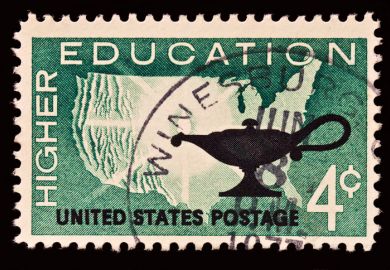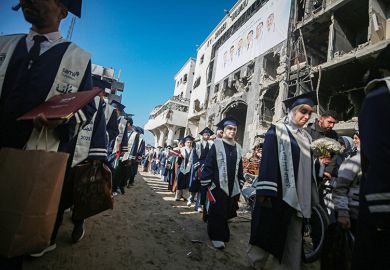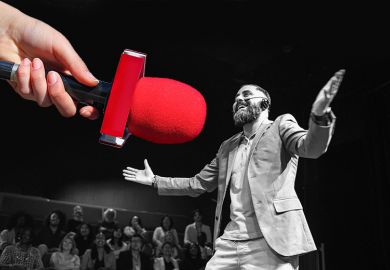A sequence of open letters from academics on Gaza and Israel began with a public statement to the UK prime minister and leader of the opposition from senior academics at the University of Oxford urging them to call for a ceasefire.
As “academics who spend [their] lives thinking about events such as these”, their conclusion is that “to think that the atrocities perpetrated by Hamas justify the humanitarian crisis currently unfolding in Gaza is to indulge a central tenet of terrorism – that all citizens must pay for the misdeeds of their governments – as well as terrorism’s central practice: collective punishment.”
But a response letter by Oxford emeritus philosophy professor Peter Hacker disagreed scathingly. “Despite including professors of international relations among its authors, [the letter] fails to place the Hamas onslaught in its current Middle Eastern context,” he says. The intellectual’s “vocation is clarity of thought, but what use has philosophy been to them if they cannot think clearly on matters of such import?” he asks, going on to accuse the writers of “glowing self-righteousness” and of making “knavish or foolish” claims, concluding that “they should be ashamed of themselves”.
But not everyone was convinced by Hacker’s riposte either. Some weeks later, a group of mostly American philosophers issued a statement unequivocally expressing solidarity with the Palestinian people. They disclaimed “any unique authority – moral, intellectual or otherwise” but noted that philosophy “has made admirable strides recently in confronting [its] historically exclusionary practices and in engaging directly with pressing and urgent injustices. To this end, we call on our colleagues in philosophy to join us in overcoming complicity and silence”.
Campus resource collection: What can universities do to protect academic freedom?
Again, not everyone did so, however. Yale University professor of political science and philosophy Seyla Benhabib hit back in yet another “open letter”, whose critique of the letter’s arguments was less partisan than Hacker’s but no less contentious. “As philosophers we need to get our ideas clear,” Benhabib concluded. But her letter has been widely accused of containing factual errors and narrative mistakes.
Another letter, this time by German political theorists, suggests that however clear their ideas, there is nothing that philosophers can say about the present moment because philosophy moves slowly while the world accelerates. Perhaps, in some ways, they are right. The open letter sequence certainly speaks to the fact that academics are rarely better placed than many others to reach a view that is both well informed and reached in good faith – not least because most academics are subject to the same moral tribalism, political biases and blind spots as everyone else.
Yet another open letter, written this time by actual experts on the Holocaust and antisemitism, argues that “seventy-five years of displacement, fifty-six years of occupation, and sixteen years of the Gaza blockade have generated an ever-deteriorating spiral of violence that can only be arrested by a political solution…Deploying a Holocaust narrative in which an “evil” must be vanquished by force will only perpetuate an oppressive state of affairs that has already lasted far too long”.
Personally, I agree – but does it take an academic to see this? And is it really an academic’s role to make that case?
These letters remind me of Jean-Paul Sartre’s radical redefinition of the role of an “intellectual” following the events of May 1968. He embraced a new vision of the revolutionary intellectual focused on the practicalities of real life, and rejected his previous conception of a “technician of practical knowledge”: someone who looks for universal truths in particular situations.
I agree that at strategic points, academics may choose the trenches. However, the revolutionary and the classical intellectual operate in distinct spheres, and any attempt to blend these two worlds is a mistake.
Of course, research and teaching on social issues will always be, to some degree, a political matter. As feminists have shown, even the natural and medical sciences are thoroughly dispersed with gendered political values. However, academics must be careful not to fly flags: not to turn classrooms into sit-ins and scholarship into activism – and this includes the publication of half-baked open letters. As academics, we have a duty to reach for the truth and to speak those truths with the intent to educate rather than persuade.
In the humanities and social sciences, particularly in political philosophy, there is all too often a hubris whereby academics think that expertise in the nuanced and often nerdy corners of their disciplines puts them in the same category as the scientists who really do understand a whole bunch of things that normal people do not – and that are very relevant to policy questions on issues such as coronaviruses, climate change or migration flows. But I doubt that there is anything that humanists or social scientists can say qua academics about specific political crises apart, perhaps, from correcting a few common misapprehensions about facts or weight of evidence. The open letters achieve neither of these objectives.
As for my own tribe, philosophers, we should not dress up our own publicly trumpeted attitudes and sentiments as “truths” grounded in our standing as “intellectuals” or “scholars”. Philosophers are good at sharpening the tools of normative thinking but are as often wrong about “feelings” as anyone else. And whereof one cannot speak, as Wittgenstein famously put it, I wonder why more of us are not content with being silent.
Adrian Kreutz is lecturer in political theory at the University of Amsterdam. He is also finishing a PhD in politics at the University of Oxford on the legitimacy of non-state actors. He was recently involved in projects at the United Nations Division of Palestinian Rights and Al-Haq Centre of Applied International Law.
Register to continue
Why register?
- Registration is free and only takes a moment
- Once registered, you can read 3 articles a month
- Sign up for our newsletter
Subscribe
Or subscribe for unlimited access to:
- Unlimited access to news, views, insights & reviews
- Digital editions
- Digital access to THE’s university and college rankings analysis
Already registered or a current subscriber?









